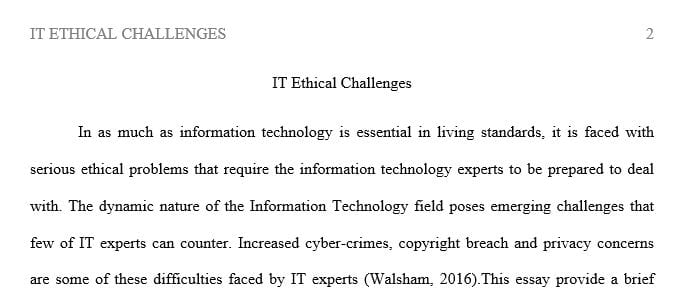The four ethical topics pertinent to organizations in the IT industry and organizations
The four ethical topics pertinent to organizations in the IT industry and organizations that make use of IT: 1) use of nontraditional workers, 2) whistle-blowing, 3) green computing, and 4) ICT code of ethics. According to the Bureau of Labor Statistics, during the period from 2006 to 2014, networking and data communications positions are forecasted to grow by 50%.
In response to the projected shortfall of labor, employers are turning to contingent workers, H-1B workers, and outsourced offshore workers.
H-1B as a temporary working visa granted by the U.S. Citizenship and Immigration Services (USCIS) for people who work in jobs that require a four-year bachelor’s degree or higher in a specific field. Companies turn to H-1B workers to meet critical business needs or to obtain essential technical skills and knowledge that are not readily found in the U.S. H-1B professionals often are hired to provide technical expertise in overseas markets or on projects that enable U.S. companies to compete globally. Employers are required to pay H-1B workers the prevailing wage for U.S. workers to do equivalent jobs, and a person can work for a U.S. employer on an H-1B visa for a maximum of six continuous years.
Outsourcing as a long-term business approach to meeting staffing needs. With outsourcing, companies make contracts with an outside firm to perform a specialized function on an ongoing basis, and give examples of outsourcing. Coemployment legal problems are minimal because the company that contracts for services does not supervise or control the contractor’s employees. Primary rationale for outsourcing is to lower costs, but companies also use it to gain strategic flexibility and to focus on their core competencies.
Whistle-blowing as an effort to attract public attention to a negligent, illegal, unethical, abusive, or dangerous act by a company that threatens the public interest. In most cases, whistle-blowers act ethically in an attempt to correct what they think is a major wrongdoing, often at great personal risk. The whistle-blower usually has special information about what is happening based on personal expertise or a position of employment within the offending organization.
There are no comprehensive federal laws to protect all whistle-blowers; rather, there are numerous laws, and each protects a certain class of whistle-blowing acts in various industries.
In order to manufacture truly “green” products, companies must: 1) reduce the amount of hazardous materials used, 2) increase the amount of reusable or recyclable materials, and 3) help consumers dispose of their products in an environmentally safe manner at the end of the product’s useful life. Electronic devices contain thousands of components, some harmful to humans and environment. The entire supply chain is at risk.
Discuss what you think is a serious ethical IT challenge. What specific company or industry might face risks from these challenges? How would you avoid ethical issues?
The following resources are recommended for use in composing an answer for this Discussion Topic:
Information Technology and Ethics: #4 – Read: Ethics for IT Professionals (Non-traditional Workers)
Boundless Management by Boundless: Chapter 13, Ethics in Business, specifically Section 3: Maintaining Ethical Standards including: Whistleblower Protection
Answer preview to the four ethical topics pertinent to organizations in the IT industry and organizations
APA



